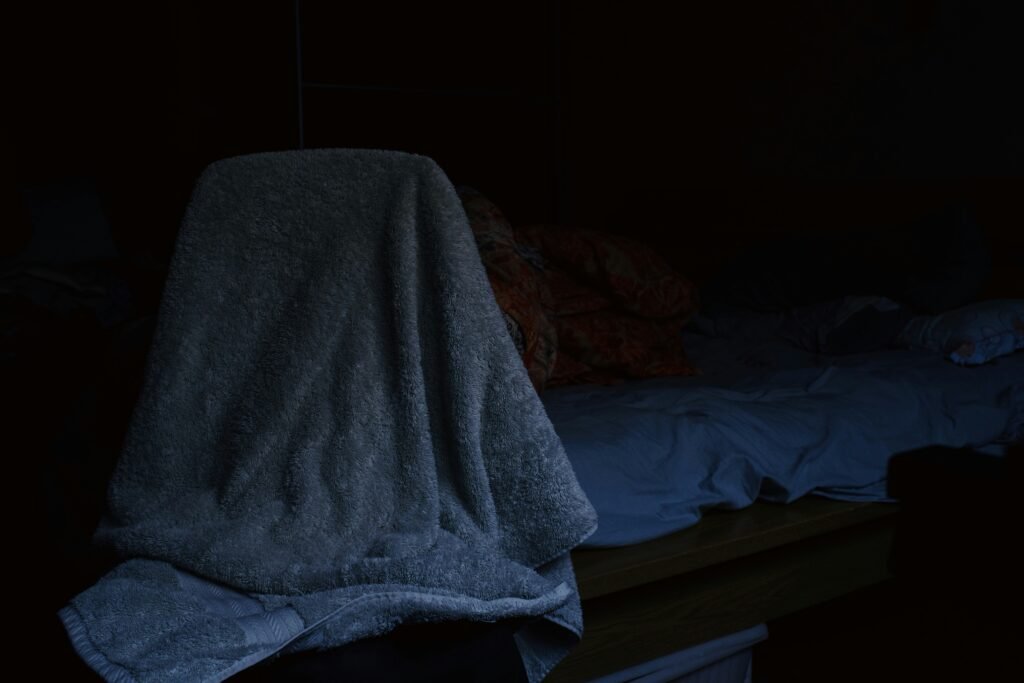Picture this: It’s 2 a.m., and you’re wide awake, staring at the ceiling while your partner’s snoring rattles the windows like a malfunctioning chainsaw. Or perhaps you’re curled up on the edge of the bed, shivering under a sliver of blanket as your beloved unwittingly claims the entire duvet in their sleep. These scenarios are all too familiar for many couples, where mismatched sleep habits turn what should be a restful night into a battleground. Sleep habits—those nightly routines and involuntary behaviors that dictate how we rest—can make or break not just our energy levels the next day, but the harmony in our relationships.
In a world where quality sleep is increasingly recognized as essential for health and well-being, dealing with a partner’s disruptive sleep habits without resorting to separate bedrooms is a challenge worth tackling. This deep-dive article explores practical, empathetic strategies to survive and thrive amidst snoring symphonies and midnight kicks. We’ll delve into the science behind these issues, their effects on your life, and actionable solutions drawn from expert insights and real-world tips. Whether it’s the thunderous rumble of snoring or the territorial tug-of-war over covers, understanding and addressing these sleep habits can lead to sweeter dreams for both of you. By the end, you’ll have a toolkit to foster better rest together, proving that love doesn’t have to mean losing sleep.
Sleep habits aren’t just personal quirks; they’re influenced by biology, lifestyle, and environment. According to surveys, over a third of Americans occasionally opt for a “sleep divorce”—sleeping in separate spaces—to accommodate their partner’s habits. But what if you could avoid that? This article aims to show you how, emphasizing communication, lifestyle tweaks, and environmental adjustments. Let’s start by examining the most common culprits disrupting couples’ nights.
Common Disruptive Sleep Habits in Couples
When sharing a bed, even the most loving couples can encounter sleep habits that turn bedtime into a comedy of errors—or a source of frustration. A recent survey revealed that 82% of Americans admit their partner’s sleep habits wake them up at night. Snoring tops the list, with 52% of people citing it as a major disturbance, followed by phone scrolling (33%) and frequent bathroom trips (33%). Other common issues include restless movements like kicking or tossing, blanket hogging, differing sleep schedules, and even cuddling styles that feel more like wrestling matches.
Snoring, often dismissed as harmless, affects up to 90 million Americans at some point, with 37 million snoring regularly. It’s caused by vibrations in the throat tissues during breathing, exacerbated by factors like weight, alcohol, or nasal congestion. For the non-snorer, it can feel like sleeping next to a freight train, leading to fragmented sleep.
Restless legs syndrome (RLS), also known as Willis-Ekbom disease, prompts uncomfortable sensations that make legs twitch or kick involuntarily, especially at night. This can result in “midnight kicks” that jolt a partner awake. Periodic limb movement disorder (PLMD), a related issue, causes involuntary jerking every 15 to 40 seconds during sleep.
Blanket hogging might seem trivial, but it’s a frequent complaint rooted in differing body temperatures or subconscious movements. One partner might roll up in the covers, leaving the other exposed and cold. Differing sleep positions—such as starfishing (spreading out like a star) or spooning gone wrong—can encroach on space, especially in smaller beds.
Differing chronotypes add another layer: If one is a night owl and the other an early bird, mismatched schedules can lead to disturbances like late-night lights or early alarms. Even positive habits, like cuddling, can disrupt if one partner overheats or feels confined.
These sleep habits aren’t just annoying; they stem from deeper physiological or environmental factors. Understanding them is the first step to empathy. For instance, snoring might indicate sleep apnea, while restless legs could link to iron deficiency or genetics. Recognizing that these aren’t intentional acts can shift the narrative from blame to problem-solving.
In one study, nearly one-third of adults have tried sleeping separately due to these issues, but many prefer staying together for emotional closeness. The key is addressing them collaboratively, as we’ll explore next.
The Impact of Poor Sleep on Health and Relationships
Disruptive sleep habits don’t just steal hours of rest; they can erode the foundation of your relationship and health. Poor sleep quality, often triggered by a partner’s habits, leads to increased anger, decreased relationship satisfaction, and even feelings of jealousy or insecurity. Research shows that sleep-deprived couples report lower gratitude toward each other, feeling unappreciated after restless nights.
Physically, chronic sleep disruption raises risks for heart disease, diabetes, and weakened immunity. For the non-snorer, constant awakenings from snoring can mimic sleep deprivation, leading to daytime fatigue, irritability, and cognitive fog. A Mayo Clinic study found that snorers wake their partners almost as often as themselves, amplifying emotional strain. Women living with heavy snorers report higher rates of disturbed sleep, headaches, and sleepiness.
Relationally, the toll is stark. Over 25% of people say a snoring partner makes them annoyed or angry, with 40% of women finding it a turn-off. In extreme cases, snoring is cited as the third leading cause of divorce, behind infidelity and finances. Poor sleep exacerbates conflicts: Tired partners are more likely to argue, less empathetic, and struggle with intimacy. One study linked poor sleep to heightened negativity and reduced emotional connection.
Depression can mediate these effects, as strained relationships from bad sleep habits feed into mental health issues. For couples, this creates a vicious cycle: Disrupted sleep leads to resentment, which worsens sleep further.
Yet, positive sleep habits can strengthen bonds. Couples with aligned routines report higher satisfaction, as shared rest fosters vulnerability and closeness. Addressing these issues isn’t just about survival—it’s about enhancing your partnership.
Communicating About Sleep Issues
Before diving into solutions, open dialogue is crucial. Many couples avoid discussing sleep habits for fear of an argument, but avoiding it only builds resentment. Choose a calm, non-bedtime moment to talk, like over coffee, to keep emotions in check.
Start with empathy: Frame it as “we” problem, not “you” fault. Say, “I’ve noticed our sleep habits are affecting how rested we feel—let’s find ways to improve it together.” This reduces defensiveness.
Use open-ended questions: “How do you feel about our bedtime routine?” or “What might help you sleep better?” Listen actively, validating feelings without interrupting.
Be specific about impacts: Share how snoring or kicking affects your day, but avoid blame. Suggest compromises, like trying remedies before drastic changes.
If discussing snoring, approach with compassion—many snorers are unaware. Offer support: “I’m here to help find solutions.”
For ongoing issues, revisit conversations kindly. Patience is key; changes take time. Effective communication turns sleep habits from dividers to unifiers.
Tackling Snoring: Causes and Natural Remedies
Snoring, that nocturnal symphony, arises from relaxed throat muscles narrowing airways, causing vibrations. Common causes include obesity, alcohol, smoking, allergies, or anatomy like a deviated septum.
Natural remedies abound. Sleep on your side to prevent tongue fallback—use a body pillow. Lose weight if applicable; even modest loss reduces throat fat.
Avoid alcohol before bed, as it relaxes muscles excessively. Elevate your head 4-6 inches with pillows or bed risers to open airways.
Nasal strips or dilators widen nostrils for better airflow. Keep air moist with a humidifier to ease congestion.
Throat exercises strengthen muscles: Try pressing your tongue to the roof of your mouth or singing vowels. Essential oils like peppermint or eucalyptus in a diffuser can reduce inflammation.
Herbal teas with chamomile or spearmint calm airways. Practice good sleep hygiene: Consistent schedules and avoiding screens.
For the listener, earplugs or white noise machines mask sounds. With persistence, these can quiet the symphony.
Managing Restless Legs and Midnight Kicks

Restless legs syndrome causes crawling, itching sensations, leading to kicks. Causes include dopamine issues, iron deficiency, pregnancy, or medications.
Solutions start with lifestyle: Avoid caffeine, alcohol, tobacco evenings. Establish routines; stretch or walk before bed.
Warm baths or cold compresses soothe legs. Iron supplements if deficient—aim for ferritin above 50 mcg/L.
Massage or compression socks help. For severe cases, medications like gabapentin. Quit smoking and exercise moderately.
Partners can use barriers like pillows to minimize impact. Addressing root causes reduces kicks, improving shared sleep.
Winning the Blanket Wars
Blanket hogging stems from subconscious rolling or temperature differences. Solutions include the Scandinavian method: Separate duvets for individual control. This maintains closeness without tug-of-war.
Use larger blankets or tuck them securely. Blanket suspenders clip covers in place.
Electric blankets preheat for warmth without extra layers. Keep extras bedside for quick grabs.
Upgrade to a bigger bed for space. Discuss preferences—maybe one needs lighter covers.
These tweaks end the wars, ensuring cozy nights.

Creating an Optimal Sleep Environment
A shared bedroom should promote rest. Keep it cool (65-72°F) for optimal sleep. Use blackout curtains, earplugs, or white noise.

Declutter for calm; emphasize symmetry in layout. Essential oils like lavender aid relaxation.
Stick to schedules, limit naps, exercise daily. Invest in a supportive mattress for couples.
Compromise on routines: Dim lights early, avoid screens.
This environment harmonizes sleep habits.
When to Seek Professional Help
If habits persist despite efforts, consult pros. See a doctor if symptoms last over four weeks or impair function. Signs include loud snoring with pauses (apnea), chronic insomnia, or daytime exhaustion.
Sleep specialists diagnose via studies. For RLS or apnea, early intervention prevents complications.
Don’t hesitate—better sleep awaits.
Conclusion
Surviving your partner’s sleep habits requires patience, creativity, and love. From snoring remedies to blanket solutions, small changes yield big improvements. Prioritize communication and s


Recent Comments